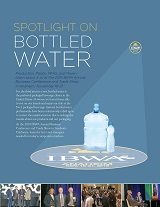A Letter to the Editor, from the Recorder & Times in Ontario, Canada: We are being told to ban bottled water because large companies make huge profits, use energy to produce bottles and only about 15 per cent of bottles get recycled, the balance end up in landfills.
Municipalities, school boards and other public buildings should make water fountains available. The way I see it, bottled water is a convenience item sold only to those willing to pay for it. I would bet the majority of bottled water is bought in case lots on sale at almost every grocer or the seemingly much hated big-box stores for anywhere between nine and 15 cents a bottle. When you buy it as a single unit at convenience stores, you should expect to pay more for it.
Convenience stores pay delivery costs, energy costs to cool the water, wages and somewhere in there is a profit. I don’t see a saving in energy use if water bottles are banned. The plastic for soft drinks/juices and water is already manufactured before it is shaped into a container. Water fountains became a thing of the past years ago mostly because of health and sanitary concerns. If you are old enough to remember, you will know you had no idea what you might see floating in the bottom or who or what touched the nozzle last. Warm water is not very refreshing on a hot day so cooling units requiring electrical energy were eventually added.
Tap water or fountains at soccer/baseball or other outdoor activities don’t seem like an option. Sure, you can fill your own container at home and put it in your energy-consuming refrigerator or buy ice to pack it in. I should mention that ice is the result of using energy to freeze water. Ice is sold in “plastic” bags by companies making huge profits. Should we ban ice? We are told only 15 to 20 per cent of water bottles go to recycling. I guess that means 100 per cent of all other bottles get recycled.
I place 100 per cent of all plastic bottles in my recycling container and on occasion watch as it is dumped into the recycling truck. Is recycling not working? Should we ban recycling? A bottled water ban, if successful, would put more people out of work at a time when the economy is bad and jobs scarce.
Let’s start LATBB (Local Association To Ban Banning). Dell Bower Merrickville



























